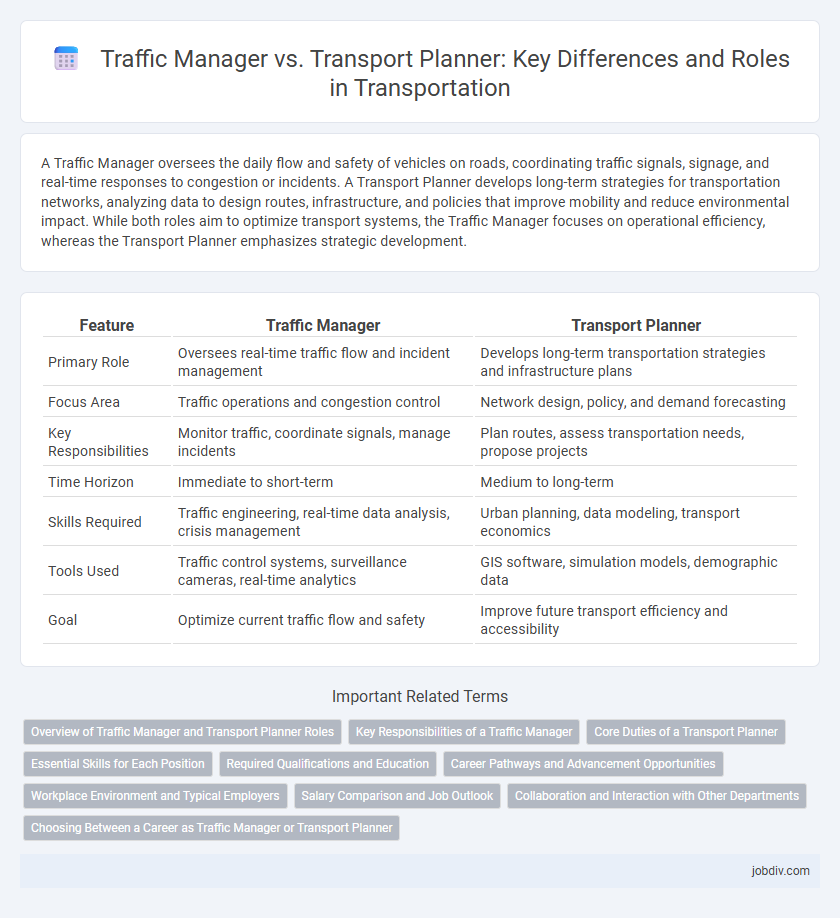A Traffic Manager oversees the daily flow and safety of vehicles on roads, coordinating traffic signals, signage, and real-time responses to congestion or incidents. A Transport Planner develops long-term strategies for transportation networks, analyzing data to design routes, infrastructure, and policies that improve mobility and reduce environmental impact. While both roles aim to optimize transport systems, the Traffic Manager focuses on operational efficiency, whereas the Transport Planner emphasizes strategic development.
Table of Comparison
| Feature | Traffic Manager | Transport Planner |
|---|---|---|
| Primary Role | Oversees real-time traffic flow and incident management | Develops long-term transportation strategies and infrastructure plans |
| Focus Area | Traffic operations and congestion control | Network design, policy, and demand forecasting |
| Key Responsibilities | Monitor traffic, coordinate signals, manage incidents | Plan routes, assess transportation needs, propose projects |
| Time Horizon | Immediate to short-term | Medium to long-term |
| Skills Required | Traffic engineering, real-time data analysis, crisis management | Urban planning, data modeling, transport economics |
| Tools Used | Traffic control systems, surveillance cameras, real-time analytics | GIS software, simulation models, demographic data |
| Goal | Optimize current traffic flow and safety | Improve future transport efficiency and accessibility |
Overview of Traffic Manager and Transport Planner Roles
Traffic Managers oversee the efficient movement of vehicles and pedestrians, implementing traffic control measures and coordinating signal systems to reduce congestion and improve safety. Transport Planners develop long-term strategies for transportation networks, analyzing data to design sustainable and cost-effective solutions for future travel demands. Both roles collaborate to optimize urban mobility, balancing immediate traffic flow with strategic infrastructure development.
Key Responsibilities of a Traffic Manager
Traffic Managers oversee the daily flow of vehicles and pedestrians, optimizing traffic signals and route planning to reduce congestion and improve safety. They analyze traffic data, coordinate with local authorities, and implement policies for efficient transportation management. Their responsibilities include incident management, enforcement of traffic regulations, and ensuring compliance with environmental standards.
Core Duties of a Transport Planner
A Transport Planner specializes in developing efficient transportation systems by analyzing traffic patterns, assessing infrastructure needs, and designing sustainable mobility solutions that reduce congestion and environmental impact. Their core duties include conducting travel demand forecasting, planning public transit routes, and coordinating with urban development projects to ensure seamless integration of transport networks. Unlike Traffic Managers who focus on real-time traffic flow and control, Transport Planners emphasize long-term strategy and infrastructure planning to optimize city-wide transportation frameworks.
Essential Skills for Each Position
Traffic Managers excel in real-time traffic monitoring, incident response, and resource allocation to optimize flow and reduce congestion. Transport Planners specialize in data analysis, urban planning, and policy development to design effective transportation systems and long-term infrastructure projects. Both roles require strong communication, problem-solving abilities, and proficiency with transportation modeling software.
Required Qualifications and Education
Traffic Managers typically require a bachelor's degree in traffic management, transportation engineering, or a related field, coupled with experience in traffic flow analysis and regulatory compliance. Transport Planners often hold degrees in urban planning, civil engineering, or geography, emphasizing skills in spatial analysis, land use planning, and transport policy development. Both roles benefit from certifications such as Professional Traffic Operations Engineer (PTOE) or membership in planning institutes to enhance professional credibility.
Career Pathways and Advancement Opportunities
Traffic Managers specialize in overseeing traffic flow and optimizing vehicular movement, often progressing to senior management roles within traffic control agencies or private transport firms. Transport Planners focus on developing long-term transportation strategies and infrastructure projects, advancing towards positions in urban planning departments or consultancy leadership. Career pathways for both roles offer advancement opportunities through certification, specialization in sustainable transport solutions, and expertise in smart mobility technologies.
Workplace Environment and Typical Employers
Traffic Managers often work within municipal transportation departments, logistics companies, or large-scale infrastructure firms, managing traffic flow and safety in dynamic, fast-paced office or field environments. Transport Planners typically operate in urban planning agencies, consultancy firms, or governmental bodies, focusing on designing long-term transport systems in collaborative, project-driven office settings. Both roles require adaptability to changing project demands but differ in workplace culture, with Traffic Managers engaging more in operational decision-making and Transport Planners emphasizing strategic development and policy analysis.
Salary Comparison and Job Outlook
Traffic Managers typically earn a median salary of $75,000 annually, while Transport Planners average around $68,000, reflecting higher compensation for managerial responsibilities. The job outlook for both roles is positive, with a projected growth rate of 8% for Traffic Managers and 7% for Transport Planners over the next decade, driven by expanding urban infrastructure projects. Demand for skilled professionals in transportation logistics and urban mobility ensures competitive salaries and stable employment opportunities in both careers.
Collaboration and Interaction with Other Departments
Traffic managers coordinate closely with operations, logistics, and public safety departments to implement real-time traffic flow adjustments and incident responses. Transport planners collaborate extensively with urban development, environmental agencies, and public transit authorities to design sustainable transportation systems and long-term infrastructure projects. Both roles require effective communication and data sharing to optimize roadway efficiency and ensure regulatory compliance across departments.
Choosing Between a Career as Traffic Manager or Transport Planner
Choosing between a career as a Traffic Manager or Transport Planner depends on your interest in operational management versus strategic development. Traffic Managers focus on optimizing the flow of vehicles and coordinating transportation logistics in real-time, while Transport Planners design and implement long-term transportation systems, policies, and infrastructure projects. Skills in traffic analysis, route optimization, urban planning, and data modeling are critical for success in these distinct but complementary roles within the transportation industry.
Traffic Manager vs Transport Planner Infographic

 jobdiv.com
jobdiv.com